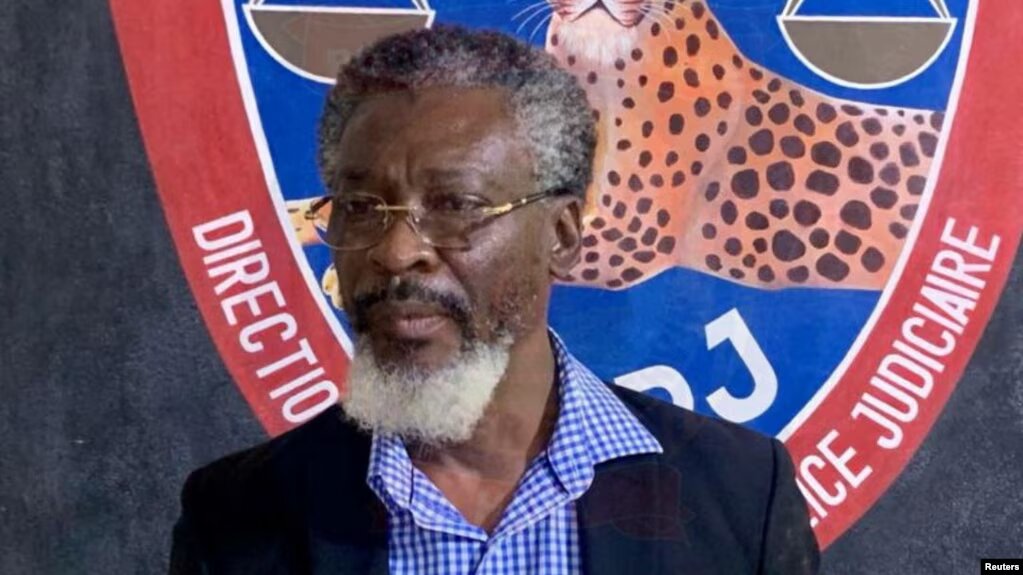MIAMI (AP) — A former Colombian soldier pleaded guilty Friday to conspiring in the 2021 assassination of Haitian President Jovenel Moïse, which plunged the Caribbean nation into violence and political turmoil.
Mario Antonio Palacios Palacios, 45, pleaded guilty to three charges, including conspiracy to commit murder or kidnapping outside the United States, during a brief hearing before federal Judge José E. Martínez. Seated next to his attorney, Alfredo Izaguirre, Palacios answered “Yes, your honor,” in Spanish when the judge asked if he was pleading guilty.
Palacios is the fifth of 11 defendants in Miami to plead guilty in the 2021 assassination. As part of a deal with prosecutors, he agreed to cooperate with the investigation and to plead guilty. He could get up to life in prison when he’s sentenced March 1, but under the deal, prosecutors conceded that he played a minor role in the plot.
“He didn’t know what he was going to get into. He wasn’t part of the plan,” Izaguirre told reporters after the hearing. “He didn’t recruit anybody. He didn’t make any decision making authority in regards to the conspiracy. I think the government understands.”

Late Haitian President Jovenel Moïse
According to prosecutors, the conspirators initially planned to kidnap the Haitian president but later decided to kill him. They say the plotters had hoped to win contracts under Moïse’s successor. About 20 former Colombian soldiers and several dual Haitian American citizens participated in the plot, authorities say.
Moïse was shot 12 times at his private home near the Haitian capital of Port-Au-Prince on July 7, 2021. He was 53. His wife, Martine Moïse, was injured in the attack.
Three defendants have already been sentenced to life in prison in the case. A fourth, dual Haitian American national Joseph Vincent, pleaded guilty this month and is awaiting his sentencing in February.
The trial is scheduled for May 2024, although the date has been postponed several times.
Palacios was detained in Jamaica in October 2021 and was flown to the U.S. during a stopover in Panama while on a flight from Jamaica to Colombia. Federal officials say they had interviewed him while he was still hiding in Jamaica.
Haiti authorities have arrested more than 40 suspects, among them 18 former Colombian soldiers accused of taking part in the plot and several high-ranking Haitian police officers. In the Caribbean nation, at least five judges have been appointed to the case and four of them have stepped down for various reasons, including fear of being killed.
Who hired the Colombians?
Haitian police chief Léon Charles said Dr. Sanon, who was arrested after the assassination, was a “key suspect” in the case.
According to Charles, Dr. Sanon hired 26 of the 28-strong hit squad through a Miami-based company called CTU, run by Venezuelan national Tony Intriago. Dr. Sanon, he added, was “the first person” that one of the Colombian suspects had called when police surrounded them.
Dr. Sanon, a 63-year-old doctor who lived in Florida, arrived in Haiti on a private jet in early June with “political motives”, Charles said, adding that police had found weapons, ammunition and a Drug Enforcement Administration cap in his possession.
The police chief suggested that the Colombians might have been duped by Dr. Sanon, who was planning to become Haiti’s president.
“The initial mission that was given to these assailants was to protect the individual named Emmanuel Sanon, but afterwards the mission changed,” he said without clarifying if all or any of the suspects had been briefed about the changes.
Another prime suspect, according to Charles, was former Haitian senator John Joel Joseph, who allegedly supplied weapons and planned meetings. He was arrested in January in Jamaica.

Joseph Felix Badio in Haiti
Joseph Felix Badio, a former official in the justice ministry’s anti-corruption unit, also seen as a key suspect in the case, was arrested in Petion-Ville, a Port-au-Prince suburb, in October.
In the two years following Moïse’s assassination, Haiti has experienced a surge in gang violence that led the prime minister to request the immediate deployment of a foreign armed force. The U.N. Security Council voted in October to send a multinational force led by Kenya to help fight gangs.
The deployment, however, have been delayed. Kenyan officials told the AP that the first group of about 300 officers is expected by February, with authorities still awaiting the verdict in a case that seeks to block the deployment. A decision is expected in January.
